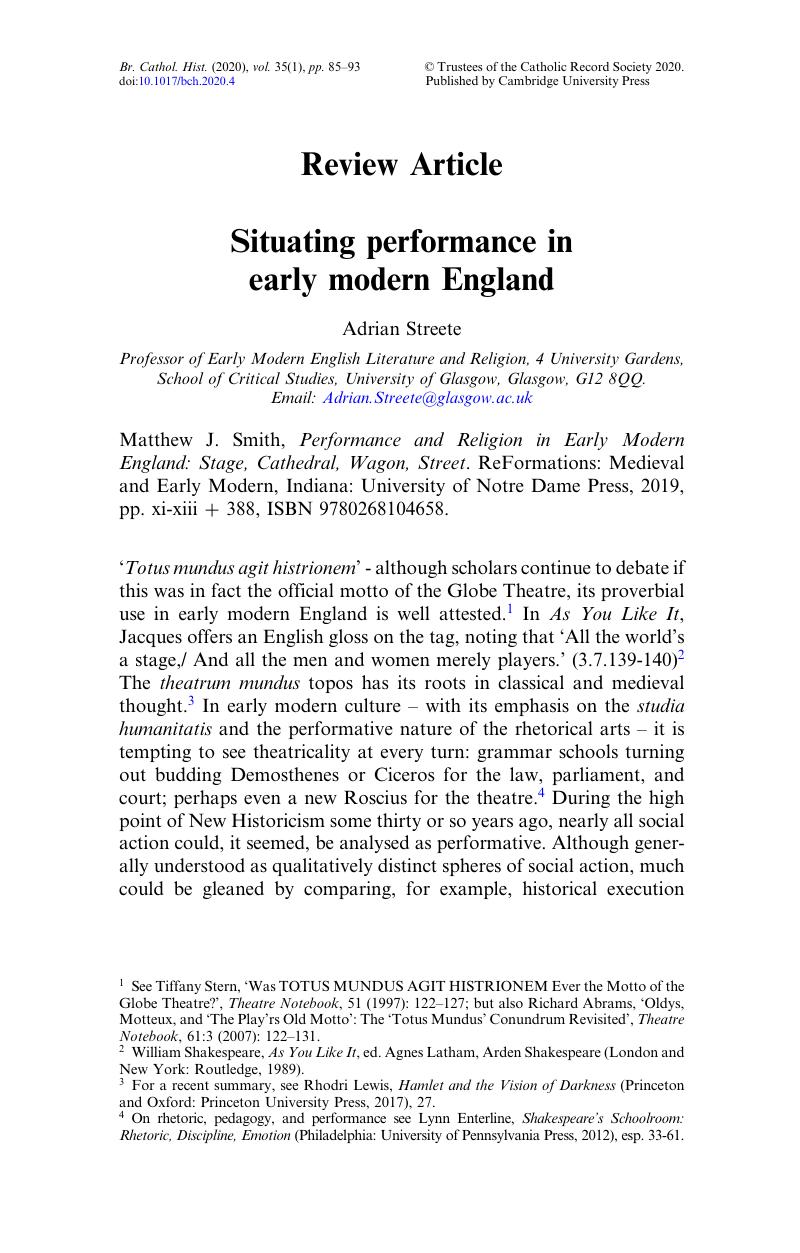No CrossRef data available.
Published online by Cambridge University Press: 08 April 2020

1 See Stern, Tiffany, ‘Was TOTUS MUNDUS AGIT HISTRIONEM Ever the Motto of the Globe Theatre?’, Theatre Notebook, 51 (1997): 122–127Google Scholar; but also Abrams, Richard, ‘Oldys, Motteux, and ‘The Play’rs Old Motto’: The ‘Totus Mundus’ Conundrum Revisited’, Theatre Notebook, 61:3 (2007): 122–131Google Scholar.
2 Shakespeare, William, As You Like It, ed. Latham, Agnes, Shakespeare, Arden (London and New York: Routledge, 1989)Google Scholar.
3 For a recent summary, see Lewis, Rhodri, Hamlet and the Vision of Darkness (Princeton and Oxford: Princeton University Press, 2017), 27Google Scholar.
4 On rhetoric, pedagogy, and performance see Enterline, Lynn, Shakespeare’s Schoolroom: Rhetoric, Discipline, Emotion (Philadelphia: University of Pennsylvania Press, 2012)CrossRefGoogle Scholar, esp. 33-61.
5 See for example Smith, Molly, ‘The Theater and the Scaffold: Death as Spectacle in The Spanish Tragedy’, Studies in English Literature, 32:2 (1992): 217–232CrossRefGoogle Scholar.
6 See for example Ann Baynes Coiro and Thomas Fulton eds. Rethinking Historicism from Shakespeare to Milton, (Cambridge: Cambridge University Press, 2012), and Parvini, Neema, Shakespeare’s History Plays: Rethinking Historicism (Edinburgh: Edinburgh University Press, 2012)CrossRefGoogle Scholar, esp. 10-32.
7 A seminal essay in this regard is Aers, David, ‘A Whisper in the Ear of Early Modernists; or, Reflections on Literary Critics Writing the ‘History of the Subject’, in David Aers ed. Culture and History 1350-1600 (Detroit: Wayne State University Press, 1992), 177–202Google Scholar. See also Simpson, James, The Oxford English Literary History. Volume 2, 1350-1547: Reform and Cultural Revolution (Oxford and New York: Oxford University Press, 2002)Google Scholar, and Gordon McMullan and David Matthews eds. Reading the Medieval in Early Modern England (Cambridge: Cambridge University Press, 2007).
8 The book is part of Notre Dame’s ‘ReFormations’ series edited by David Aers, Sarah Beckwith, and James Simpson, where the imperative to cross historiographical boundaries is part of the series’ brief.
9 Smith does not consider important recent work that makes similar arguments about the structure of Christian soteriology and literary form by Cefalu, Paul, The Johannine Renaissance in Early Modern English Literature and Theology (Oxford: Oxford University Press, 2017)CrossRefGoogle Scholar, and McEachern, Claire, Believing in Shakespeare: Studies in Longing (Cambridge: Cambridge University Press, 2018)CrossRefGoogle Scholar.
10 E.g. Streete, Adrian, Protestantism and Drama in Early Modern England (Cambridge: Cambridge University Press, 2009)CrossRefGoogle Scholar, esp. pp. 80-109.
11 For example, see Smith, Bruce, Phenomenal Shakespeare (Oxford: Wiley-Blackwell, 2010)CrossRefGoogle Scholar, Lupton, Julia Reinhard, Thinking with Shakespeare: Essays on Politics and Life (Chicago: University of Chicago Press, 2011)Google Scholar, Kevin Curran ed. Renaissance Personhood: Materiality, Taxonomy, Process (Edinburgh: Edinburgh University Press, 2019), and Witmore, Michael, Shakesperean Metaphysics (London: Continuum, 2008)CrossRefGoogle Scholar.
12 See Shakespearean Sensations: Experiencing Literature in Early Modern England (Cambridge: Cambridge University Press, 2013), and Hobgood, Allison P., Passionate Playgoing in Early Modern England (Cambridge: Cambridge University Press, 2014)CrossRefGoogle Scholar.
13 See Griffith, Eva, A Jacobean Company and its Playhouse: The Queen’s Servants at the Red Bull (c. 1605-1619) (Cambridge: Cambridge University Press, 2013)CrossRefGoogle Scholar, and Munro, Lucy, Children of the Queen’s Revels: A Jacobean Theatre Repertory (Cambridge: Cambridge University Press, 2005)CrossRefGoogle Scholar.
14 Heinemann, Margot, ‘Rebel Lords, Popular Playwrights, and Political Culture: Notes on the Jacobean Patronage of the Earl of Southampton’, The Yearbook of English Studies, 21 (1991): 63–86CrossRefGoogle Scholar, Hamilton, Donna B., Shakespeare and the Politics of Protestant England (Lexington: The University Press of Kentucky, 1992)Google Scholar, Mayer, Jean-Christophe, Shakespeare’s Hybrid Faith: History, Religion and the Stage (Basingstoke: Palgrave Macmillan, 2006)CrossRefGoogle Scholar, Shell, Alison, Shakespeare and Religion (London: Bloomsbury, 2010)CrossRefGoogle Scholar, and Rosendale, Timothy, Theology and Agency in Early Modern Literature (Cambridge: Cambridge University Press, 2018)CrossRefGoogle Scholar.
15 See Crockett, Bryan, The Play of Paradox: Stage and Sermon in Renaissance England (Philadelphia: University of Pennsylvania Press, 1995)CrossRefGoogle Scholar, Morrissey, Mary, Politics and the Paul’s Cross Sermon, 1558–1642 (Oxford: Oxford University Press, 2011)CrossRefGoogle Scholar, and Peter McCullough, Hugh Adlington and Emma Rhatigan eds. The Oxford Handbook of the Early Modern Sermon (Oxford: Oxford University Press, 2011).
16 See for example Ashsah Guibbory’s articles ‘Donne’s Religion: Montagu, Arminianism and Donne’s Sermons, 1624-1630’, English Literary Renaissance, 31:3 (2001): 412-439, and ‘Reconsidering Donne: From Libertine Poetry to Arminian Sermons’, Studies in Philology, 114:3 (2017): 561-590.
17 See Green, Ian, Print and Protestantism in Early Modern England (Oxford: Oxford University Press, 2000)CrossRefGoogle Scholar, Marsh, Christopher, Music and Society in Early Modern England (Cambridge: Cambridge University Press, 2010)Google Scholar, and Würzbach, Natascha, The Rise of the English Streete Balad, 1550-1650 (Cambridge: Cambridge University Press, 1990)Google Scholar.